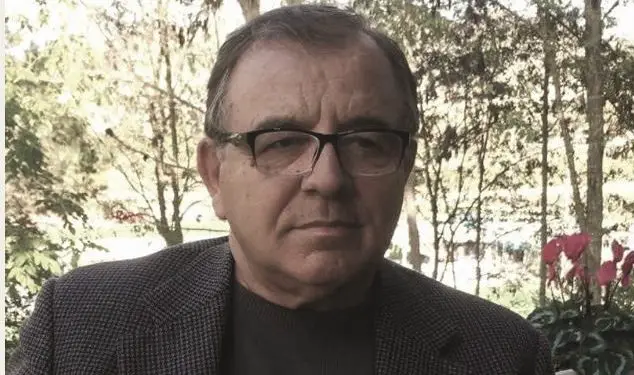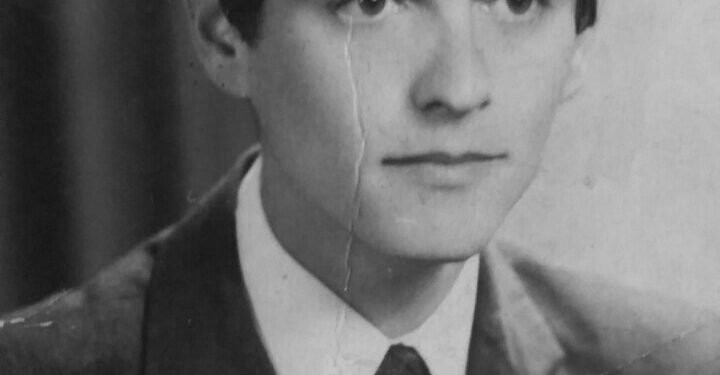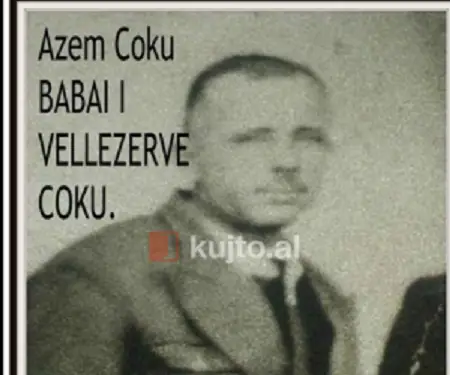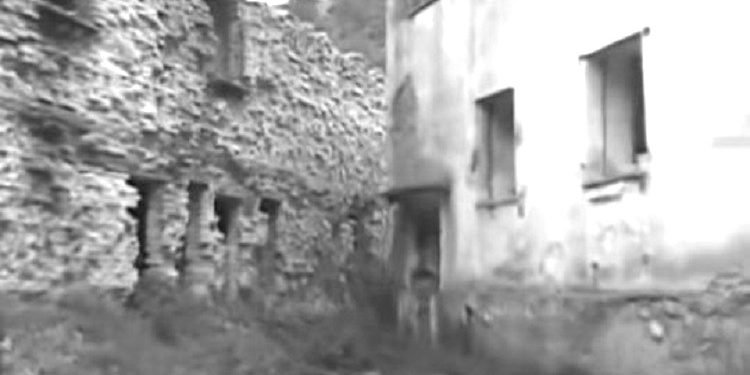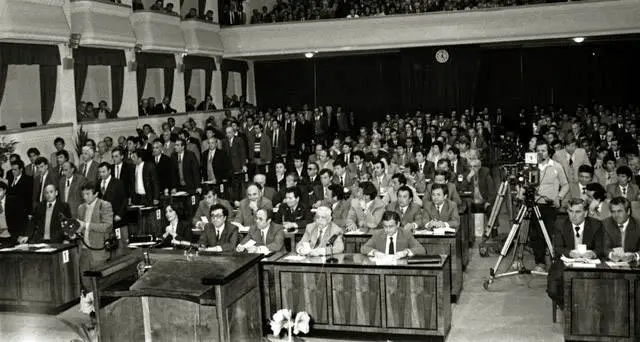From DALIP GREECE
Second part
Memorie.al / Esat Çoku, together with his wife Zyhrana and son Francin, live in Pelham Park Way, in the Bronx, NY, but Esat spends the summer months in his beautiful house, which he built in the village of Mucias, near Karavasta Swamp, in the Municipality of Remas, in Lushnje. In the story of Esat and Zyhra’s daily life, here in New York, there is nothing special to note: They are immigrants, like everyone else, they work in ordinary jobs, they get tired and worn out, and not infrequently it can happen that to express some kind of “regret” for exile, at the age of retirement. But when they turn their heads from their son and see his dedication to studies, the very good integration results in American life, they make the sufferings of exile “halal”.
Continues from last issue
The staged trial of Bedri Çok, where he and his brother, Çaushi, were judged, constitutes an act that is as tragic, in the lives of two young people, as it is comical in terms of credibility. Esati, who was summoned to the courtroom, pleaded before the jury, saying that his brothers; they were “victims” of the class war. They were declared enemies and traitors, without committing any treason against the country and the people.
In his book, Bedriu says that on their day-of-judgment, there were also the athletes of “Apollonia”, who had assisted in the trial, after a match in Gjirokastër. They had applauded when the brothers had defended themselves against the defamatory accusations.
CHAUSHI, FLEE ACROSS THE SEA…!
I got to know Çaush Çoku, the youngest of Azem Çoku’s sons, in the mid-90s, even though I had collaborated with him a lot both in the local newspaper “Ora e Põrva” and in “Republika”, where he had contributed not only with his own writings, but also with the emotional poems written in his youth, even in his own absurd time-imprisonment.
Çaushi, like his brother Bedriu, was imprisoned without committing any crime, any crime; was imprisoned simply because he was scheduled to be imprisoned. The trial that was held was a staged farce, where the directors were the operatives, investigators, judges and the prosecutor. The formula worked mechanically. One day, instead of being in the ward among his fellow soldiers of genius, he found himself in a cold prison cell, having committed no guilt, no crime, no law, and no military regulation. But what did it matter, he had to be punished. While on the day of the trial, nothing special to note:
False charges, false witnesses, the judge, the assistant judges, sang in the same chorus as the prosecutor… and that’s it…! After 6 years of harsh imprisonment, on May 21, 1973, the two brothers, Bedriu and Çaushi, took part in the Spaç revolt, and were not simply participants, but organizers. Bedriu and Çaushi, inspiring and flag-bearers.
The revolt was of shocking proportions for the communist state; it was quite unique in all the communist states of the East. A revolt brutally suppressed by the dictatorship would undoubtedly have its victims. Among the victims were the Çoku brothers, who were isolated in cells and brutally interrogated for their role in the act against the state.
Everyone was pressured; they told Bedri that the other brother, Çaushi, had been executed, while they also told Çaushi that; we will execute, just like the other brother, Bedriu. But none of the brothers entered the trap game. Both received 25 years in prison. After the special trial, they were removed from Spaçi and taken to the horror prison, that of Burrell; where it was openly said: “You enter Burrel, but you don’t leave”!
There were the most dangerous opponents of the communist government. Burrell prison had a capacity of 180 people, so the most opponents of the system. Even though they were in the same prison, the two brothers were forbidden to see each other. They met once every 6 months, or once a year, only with the permission of the command, and under the strict observation of the guards.
After leaving prison, Çaushi did not swim in the waters of Albanian politics; he was swept away by the wave of exile and he boarded the ship “Panamaja” and arrived at the shores beyond the sea, in the days of March 1991. It was lucky for the Albanian emigrants who were accompanied by him because Çaushi was a good translator for them. He quickly became known in the Italian press. His writings began to be published in the newspapers “Corriere Della Sera”, “Il Mattino”.
He quickly gained the status of European journalist “C.E.A”, perhaps among the few Albanians who enjoy this status. He also wrote for central and local Albanian newspapers. He has been in contact with prominent people in journalism and art for years. Çaushi has made a special contribution to the unsparing aid to Albanian refugees in Italy.
The two brothers who wrote poems and stories in prison
The two brothers used the prison, mainly to learn foreign languages. Using political prisoners, who had been educated around Europe, they managed to learn English, Italian, French and German. This would serve Bedri after prison, to open private foreign language courses, then as an English teacher, at the high school in Fier; while Çaushi would become a translator for Albanian immigrants in Italy and would write about Albania in Italy’s biggest newspapers.
During their imprisonment, the two brothers would not be separated from the passion of their youth, literary creativity, which became part of the indictment when they were robbed of their freedom. Çaushi wrote many poems, such as: the poem “Iliriada”, three cycles – Illyria, Arberia and Albania; the cycle “Great Weather”, “Skenderbeu with 25 songs, with 495 verses, etc.
The poet Visar Zhiti, in his notes instead of the preface, which accompanies the book; “Two brothers in one handcuff”, he writes: “Caushi composed poems in his cell, denied the prison, sang in a silent voice to his mother, freedom, lost love, place of birth, dignity and went deep, deep (like the prisoner which descends through the wet acts of the mine), to the roots of the nation, invented his Illyriad and repeated the battle with the Slavs who came from the Caucasus, where Prometheus was chained.
Çaushi’s verse is sometimes tied like prison cigarettes, wrapped in paper from the works of Enver Hoxha, sometimes harsh, like blindfolds before shooting, sweet like the moon coming to the turrets, chirping like “Burrell’s Swallow”, that the prisoners fed him with the crumbs of their hearts, sometimes confused like the twilights there, rebellious, screaming and dried up like wounds”.
As for Bedriu’s creativity, Visari will meditate: “While Bedriu in his cell, he would finish one of the novels ‘Man who overcomes himself’, and would constantly write stories. Of course it was difficult and a terrible adventure to write openly against the dictator’s dictatorship. The fee would be your blood diamonds, your shooting. And the writer prisoners exiled the events to another country or another era. So is the story ‘Sitamarrtaha’, an allegory to violence, to lies and disappointment with chilling current resonance.
Bedri is interested in social wounds, the mental backwardness of socialist society, ordinary acts (the story ‘Anger’ or ‘Criminal’). The characters in his stories want to die, have depression, are shocked by the lack of love or its loss and know how to cry manly. Bedri Çoku flies with fantasy and beyond the barbed wire of the state border and comes out in the betrayed Kosovo, writing the surprising story ‘Freedom’; it gives environments and landscapes and noble ideas…”!
Now Bedriu has in hand the autobiographical novel, with a temporary title; “We and them-Bloc and anti-block”; where everything is seen calmly, without hatred in the upside down life of this noble family. Being a character himself, from the last released in 1991, from communist prisons; he looks back and browses the troubled life of himself, his family and all Albanians.
Esati, MP together with his former investigator
I got to know Esat Çok in the first days of the Democratic Movement, when the Republican Party trusted me as the secretary of the Pluralist Executive Committee, even though I was not a member of any political party until then. The Democratic Party of Lushnja, which had Esat as a member of its leadership, had appointed him as a representative in the Executive Committee; meanwhile, he was also the president of the Association of Former Political Persecutors of Lushnja, and in the leadership of the National Association.
I had not yet met Esat, when I went to the offices of the prime minister in the capital with the democratic vice-president, I was impressed by a tall, dark-haired man, who, when he read the names of the members of the Pluralist Committee, fixed his eyes on Esat’s name and asked: – “Paskit Esatin, you of the DP”?!
– “Do you know him?” asked the democratic vice-president.
– “I was his investigator…! But I didn’t take revenge on him. I told him that what we were accusing him of, we had proven the charges, we had witnesses, we had recordings, then (the ex-investigator rested a bit) … he was planned for a long time, because he had two brothers in prison, meanwhile his father , had suffered 11 years for politics and was buried as a kulak and an enemy…! This was the voluntary explanation of the investigator Bashkim Caka, who at that moment was no longer an investigator, but was in the role of the lawyer of Prime Minister Ylli Bufi.
Later, Esati would be in the same Parliament, with his ex-investigator; one deputy of DP, the other deputy of SP. A bitter fact of Albanian democracy!
When we returned to Lushnja, we told Esati about the incident, along with former investigator Caka. He just laughed, while later, when he would go to the Parliament, together with him and his former investigator, the deputy of the SP, he would drink coffee with him, but he would not stay without telling the investigator that, before becoming deputies, in an assembly with their victims, they had to apologize…!
Then he would publish a curious article, in the local newspaper “Ora e Povra”, which I ran at the time, where he said that there could be no real democracy, when our former investigators, without apologizing to us, come to represent the people in Parliament, while they had condemned us yesterday, in the name of the people, of course without asking the people.
His former investigator had remained silent. Esat was not extremist towards those who caused him and his family suffering, but he demanded at least a public apology, from the actors and gears of the dictatorship, which has not yet been done.
With Esat, we governed in a difficult time, the time when, together with the political change, anarchist actions were manifested and Lushnja was one of the districts that was “planned” to undergo shock therapy and return to the scorched earth: The furnaces that they produced bread for the citizens; the model greenhouses of Divjaka, which once supplied the countries of the East, were abandoned; apple plantations were cut, olive trees were cut and burned, vineyards were uprooted, not to mention the looting of enterprises and factories.
Under these conditions, the Pluralist Committee (where Esati was a member, a representative of the DP and I was the secretary, a representative of the PR) tried to forget the party affiliations and become the master of the local government. We felt that the old police that we had to maintain order, in most cases, were collaborating with those who destroyed.
In these conditions we took the road to Tirana; first we called the prime minister, but he didn’t have time to wait for us; we approached the presidency, which was still headed by Ramiz Ali, but before us, the chief prosecutor and the socialist chief judge had gone there; so there was no room for us; eventually we were welcomed by the Minister of Order, Vladimir Hysi. Our complaints were about Order, we asked for the punishment of the police chief.
It was left for the confrontation to take place in Lushnje. Esati was among those who told everything openly to the chief of order, demanding his departure. I was impressed by Esati’s courage; he spoke his mind to anyone, even though the truth was bitter.
One of the collaborations with Esat was the grand reburial ceremony of 69 victims of communism, shot by Mehmet Shehu, in the village of Matjan. 69 men, among them children, were shot by Mehmet Shehu, during the war years; the motive for the murder was their participation with ‘Balli’ and the statement of one of the villagers, Kurt Xhepa from Çerme, who had declared to the terrible Mehmet Shehu: “I become a pig and I don’t become a communist”! The terrible commander who became a beast and had taken all the lead….!
The reburial of the victims of the communist terror was one of the priorities of the new democratic government, which was just standing up. The ceremony, which was organized in the city of Lushnja, was performed by Esatin; together we went to the village where the innocent victims had been shot and with the help of the villagers we secured their remains, while the old State Security tried to prevent the ceremony at all costs.
The veterans tried to oppose the public opinion, because our Pluralist Committee took a bold decision; the coffins were to be buried in the Martyrs’ Cemetery of the city, next to the plot where the Partisan martyrs were buried.
The Committee of Veterans began to move, complaints in Tirana and in our Pluralist Committee. Esati, who chaired the reburial commission, and at the same time the president of the Association of Former Political Victims, logically defended the unanimous opinion of the Pluralist Committee: You seek national reconciliation, without apologizing to us for the victims you took to the graves without a trial, without apologizing , for 64 years of my family’s prison, plus dozens of years of exile, without committing any kind of crime; and now you do not accept that reconciliation begins with the innocent dead?
The debate ended with the victory of Esati and the whole of Lushnja came out and escorted the nationalist martyrs to the cemetery. Thousands of citizens participated, and none of the dire predictions of the veterans came to pass.
Then Esat Çoku performed the duties of the secretary of the Pluralist Committee of the district of Lushnja, even though there was no solution for the problems of the residents, he tried to get along with the citizens, regardless of whose side they were, left or right; while at the meetings of his own party, he was incongruous with the deviations to the left.
Even the task he performed at the Police Station increased the credibility of the former political persecuted, Esat Çoku, while as the former president of the Association of Former Persecuted and Political Prisoners, he tried to integrate the suffering into society, while their children, to start them towards universities.
The time when he represented the Democratic Party in the Parliament, 1992-1996, was a time of trial for him, a trial that he passed successfully, while during the overturning revolution of democratic power, he tried as much as he could to stop the onslaught of the destroyers. Memorie.al




